Please note, links to all the Freedom Essays are included at the end of this essay. Open any essay to read, print, download, share or listen to (as an audio).
Freedom Essay 28
The end of racism
Written by Jeremy Griffith, 2017
In FREEDOM: The End Of The Human Condition it is finally explained that far from being the flawed, banishment-deserving, bad, even evil creatures we have for so long been portrayed as, humans are actually the heroes of the story of life on Earth, and so extraordinarily wonderful that we could be considered divine beings!
In fact, the human race has always believed that one day it would find this redeeming understanding of ourselves, but the tragic reality was that until we found that relieving insight we had no choice but to block out and deny any condemning truth about ourselves; metaphorically, we had to hide deep inside Plato’s cave of darkness (see Video/Freedom Essay 11). We couldn’t accept any implication that we were bad when we believed that one day we would explain that we weren’t bad.
And one of the most unbearably condemning truths we had no choice but to live in denial of—even though it is an extremely obvious truth—is that the more and/or longer an individual human, or even a ‘race’ (ethnic group) of humans, was exposed to the great battle that humanity has been heroically waging against ignorance, the more they would suffer from the upset state of the angry, egocentric and alienated human condition.
The particular reason this truth has been unbearably condemning while we couldn’t explain, understand and heal our upset behaviour is that it left those more upset feeling, and even portrayed as, less worthwhile and inferior to those who weren’t as upset. With the upset state of the human condition now at last explained and defended in THE Interview and Video/F. Essay 3—and of course definitively in FREEDOM—we can see how unjustly condemning and dangerous this prejudice against upset has been because what is revealed is that while humans do vary in their degree of upset as a result of humanity’s heroic battle to find self-knowledge, ALL HUMANS ARE EQUALLY GOOD. Upset is not a bad, evil state, but a good, heroic one. But again, until we could explain this truth that all humans are equally good there was the danger of unfair and destructive racist, ageist and sexist prejudice and discrimination against the more upset, and also retaliatory prejudice by the more upset towards the less upset for their either direct or implied condemnation of them. The Holocaust where 6 million Jews were exterminated by the Nazis during World War II, and in more recent times, the attempted ‘ethnic cleansing’ by the Bantu Hutu of some 800,000 of the tall, elitist Nilotic Tutsi in 100 days of bloodshed in Rwanda in 1994, are two horrific instances of the endless horrific-beyond-description examples in history of the effects of prejudice. (The nature of the prejudices involved in these two conflicts will be explained shortly.)
It is an immense relief then that understanding of the human condition finally brings an end to all prejudices like racism, because, clearly, without the clarifying explanation for why all humans are equally good, it was far too dangerous to differentiate individuals, races, genders, ages, generations, countries, civilisations and cultures according to how innocent or upset they were. It is no wonder that, to quote an article in New Scientist, when ascribing ‘genes for negative traits’ to ‘ethnic groups’ there has been concerned debate over ‘whether some avenues of research are best left un-trodden because what they reveal is bound to be socially and culturally incendiary…Or is it intellectually dishonest, even cowardly, not to investigate all aspects of the human condition?’ (see paragraph 1041 of FREEDOM).
While we couldn’t explain the upset state of the human condition it certainly has been ‘incendiary’, far too dangerous to acknowledge differences in where individuals, races, genders, ages, generations, countries, civilisations or cultures were in their progression from innocence to upset in the human journey from ignorance to enlightenment. And so the extremely dishonest attitude of not allowing differentiation simply had to be enforced. (F. Essay 35 catalogues the ever increasing vehemence of this enforcement over time and is such a significant essay it has also been produced as the standalone booklet titled Death by Dogma: The biological reason why the Left is leading us to extinction, and the solution, which is freely available on our homepage as one of the WTM’s key books.)
HOWEVER, most importantly, now that all this ‘dishonest’ denial has been defied and ‘all aspects of the human condition’ have been truthfully ‘investigate[d]’ and, as a result of that, the explanation of why all humans are equally good has been found and presented in FREEDOM, this situation completely changes. With the defence of upset found, it finally becomes both psychologically safe AND NECESSARY—if we are to truly understand ourselves and free ourselves from living in Plato’s horrible cave of soul-deadening darkness/alienation—to acknowledge differences in upset. As Christ said, ‘the truth will set you free’ (Bible, John 8:32), but of course it had to be the full truth that explains and defends us—so now that we have that full truth about our upset/corrupted condition, that truth IS what sets us free; it is what allows us to at last end the agony and horror of the human condition.
As the words of Beethoven’s famous Ninth Symphony anticipated about the effects of the arrival
of the reconciling understanding of the human condition, ‘Joy!’, ‘Joyful, as a hero to victory!’,
‘Join in our jubilation!’, ‘We enter, drunk with fire, into your [human-condition-understood]
sanctuary…Your magic reunites…All men become brothers…All good, all bad…
Be embraced, millions! This kiss [of understanding] for the whole world!’ (see par. 1049 of FREEDOM)
To provide the best elaboration on how understanding the human condition ends all prejudices, like racism, forever, the remainder of this F. Essay is a direct condensation of chapters 8:16E-F of FREEDOM:
As I will explain here, the obvious, and in truth only significant, difference that exists between humans is their degree of upset anger, egocentricity and alienation. In the case of races, there are, in fact, more innocent races who are relatively naive about the difficulties of living with the human condition, and other races who are more instinctively adapted to upset and can thus cope better with it, and others still who are so instinctively adapted to upset that they are too aware of the reality of life under the duress of the human condition and who are thus overly cynical about being ideally behaved and thus overly selfish and opportunistic and thus socially uncooperative. The result of all this variation in upset is that some races have been effective in living with the human condition while others have been either too innocent and naive, or too upset, soul-exhausted and cynical.
Although we have had to avoid it, it is an obvious truth that humans became increasingly adapted to life under the duress of the human condition, with some races becoming more adept at that adaptation than others. Just as individual humans vary in their degree of alienation from our species’ original instinctive, all-loving, selfless and trusting soulful true self (see F. Essay 21 for explanation of how we acquired our instinctive soul), so races of humans naturally vary in their degree of alienation. The longer and/or more intensely an individual or a race of people were subjected to life under the duress of the human condition, the more they naturally became adapted to that upset existence. While a relatively innocent person or relatively innocent race still behaved relatively ideally themselves and expected others to do the same, other individuals and races became so adapted to the upset/corrupt world that they no longer behaved ideally themselves and no longer expected others to behave ideally either. The longer humans were exposed to the human-condition-afflicted state the more cynical they became about human existence—a ‘cynic’ being ‘one who doubts or denies the goodness of human motives’. The psychiatrist Wilhelm Reich wrote honestly about the effects of the different levels of upset in the human race when he described how ‘The living [those relatively free of exposure to upset]…is naively kindly…It assumes that the fellow human also follows the laws of the living and is kindly, helpful and giving. As long as there is the emotional plague [the flood of upset in the world], this natural basic attitude, that of the healthy child or the primitive [innocent race]…[is subject to] the greatest danger…For the plague individual also ascribes to his fellow beings the characteristics of his own thinking and acting. The kindly individual believes that all people are kindly and act accordingly. The plague individual believes that all people lie, swindle, steal and crave power. Clearly, then, the living is at a disadvantage and in danger.’ (see par. 1026 of FREEDOM)
The consequences for a society of its people becoming overly cynical was that it meant that there would be too little soulful, selfless idealism and too much upset-adapted cynicism-derived selfishness for the society to function effectively. In the situation where it wasn’t possible to explain and thus defend upset, the closest people could come to admitting and talking about this fact that people became adapted to the human condition was to describe individuals or families or races or countries or civilisations as having become ‘dysfunctional’ and ‘decadent’, and—especially in the case of civilisations—as having ‘passed their prime’ or ‘peaked’ in terms of their creative powers.
Conversely, some races, like some individual humans, have, in fact, been too innocent to function effectively in the extremely upset-adapted, human-condition-afflicted, soul-corrupted world. The great South African philosopher Sir Laurens van der Post described how a member of the relatively innocent Bushmen people found it impossible to cope with having his innocent, natural spirit compromised: ‘You know I once saw a little Bushman imprisoned in one of our gaols because he killed a giant bustard which according to the police, was a crime, since the bird was royal game and protected. He was dying because he couldn’t bear being shut up and having his freedom of movement stopped. When asked why he was ill he could only say that he missed seeing the sun set over the Kalahari. Physically the doctor couldn’t find anything wrong with him but he died none the less!’ And Sir Laurens was even more specific when he stated that ‘mere contact with twentieth-century life seemed lethal to the Bushman. He was essentially so innocent and natural a person that he had only to come near us for a sort of radioactive fall-out from our unnatural world to produce a fatal leukaemia in his spirit.’ (Read more about Sir Laurens’ insight into the innocence of the Bushmen in F. Essay 51.) The honey-coloured Bushmen are probably the most instinctively/genetically innocent group of people living today. They are more innocent, less soul-corrupted, less adapted to upset, less toughened, than dark-skinned Bantu Africans, but in turn Bantus are not as toughened and thus as operational and successful in the human-condition-afflicted corrupted world as Caucasians from Europe. For example, I once saw a documentary in which a Bantu African said something to the effect that ‘My people can’t compete with white people, you go to sleep at night only to wake up in the morning to find white people own everything.’ In turn, European Caucasians aren’t as cynical, toughened and opportunistic—selfish—as people from even more ancient civilisations, like the Chinese from the ancient Yellow and Yangtze River valley civilisations, the Indians and Pakistanis from the ancient Indus and Ganges River valley civilisations, and the Arabs and Jews from the ancient Tigress, Euphrates and Nile River valley civilisations. (see par. 1028 of FREEDOM)
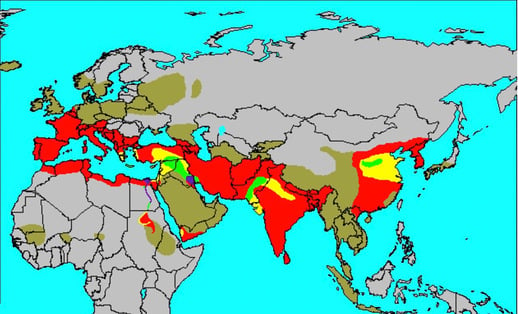
Map showing spread of civilisation.
The purple areas became civilised by 3000 BC. Civilisation spread to the
green areas by 2000 BC, yellow by 1000 BC, red by 1 AD, and olive by 1000 AD
In another documentary I once saw, this time about a huge barge that travelled up and down the Congo River from Kinshasa to Kisangani, I could see the whole innocence-destroying, toughening process going on before my eyes. While most of the Africans on the barge were happy to pass the day innocently laughing and singing together, there were a few on-board who were buying produce from each port along the way and then selling it to their fellow passengers for a profit. In my mind it wasn’t hard to extrapolate the situation and see that after only a few generations of this occurring that those who were innocently playing and enjoying life weren’t going to survive as well as those who were less soulful and focused on ‘making a living’, which is code for ‘achieving material success’—winning power, fame, fortune and glory; finding relief for their insecure human-condition-afflicted existence. Further, since their preoccupation with seeking that material relief will inevitably mean that their offspring will not receive the degree of nurturing and reinforcement they expect and require, that next generation will be even more insecure and thus even hungrier for the relief of power, fame, fortune and glory. And so it will go on, generation after generation of ever-increasing soul-less selfishness and psychological upset until there is either terminal alienation or reconciling understanding of our species’ insecure condition.
So yes, were some honest biological research to be carried out what we would learn is that the speed at which soul-corruption has occurred through generations has been very great; which means the differences in upset between ethnic groups, given their often very different histories, is now, in many cases, very great. The extent of the soul-corruption in humans that has occurred since the agricultural revolution some 11,000 years ago that allowed humans to live closer and in greater numbers, with all the upset that led to, has been especially great, which F. Essay 42 about cave paintings evidences.
The alienated and alienating city life—John Brack’s Collins Street, 5 p.m. (1955)
The situation in Fiji provides a good case-study of what invariably took place when ethnic groups of varying degrees of upset cohabitated. In the late 1800s British colonists brought Indians to Fiji as indentured labour to farm sugar cane, and by the mid-1960s half the Fijian population was Indian. As a result, a serious conflict arose between the Indian and native Fijians, which we can now understand. The Indian Fijians, coming from an older and thus naturally more cynical, human-condition-toughened, human-condition-realistic and thus opportunistic civilisation, have been so industrious and materially successful that they now monopolise the small business sector in Fiji to the extent that the native Fijians feel their country has been taken over by the Indian Fijians; for their part, however, the Indian Fijians also feel discriminated against. Indian Fijian sugar growers in particular feel this inequity, for while they produce 90 percent of the country’s sugar, they are only allowed to lease land from the native Fijians (who own 90 percent of the land). Furthermore, since gaining independence in 1970 the native Fijians have ensured their domination of the political process—a state of affairs that was reinforced in 1990 when the Fijian constitution restricted the Indians to a maximum of 27 seats in the country’s 71-seat Parliament. When this provision was amended in 1997 the Indians came to dominate the political scene, successfully electing an Indian Prime Minister in 1999. This situation, however, was overthrown in 2000 when the native Fijians led a coup—and they have remained in power ever since. As mentioned, the Indian Fijians come from a very ancient civilisation in India, one where innocence has long given way to more upset-adapted humans. In comparison, the native Fijians are still relatively innocent, yet to become embattled, hardened and upset-adapted. They aren’t manically driven to win power and glory like more embattled, upset-adapted races, preferring to spend their day tranquilly occupied by such soulful activities as playing music, drinking the sedating kava and eating taro roots from their gardens—and trusting in soulful selflessness to care for each other. It is a situation where a 20-year-old, or thereabouts, equivalent race is having to co-exist and compete with a toughened, cynical, more-upset-and-thus-more-insecure-about-their-goodness-and-thus-more-egocentrically-driven-to-try-to-prove-they-are-good-and-not-bad, competitive, selfish, opportunistic 50-year-old, or thereabouts, equivalent race.
While holidaying in Fiji in 1997 with my partner Annie Williams, a local gave us this description of the structure of Fijian society: ‘The Chinese [who he said were ‘the Jews of the East’] own all the big tourist resorts where the big money in Fiji is made, the Indians run all the shops and smaller businesses and produce all the sugar cane, and the Caucasians run the country in that they occupy so many of the important administrative positions, providing the good structure and order required for the whole society to function.’ ‘Fiji’, he added, ‘is one of the few countries in the world where the indigenous people still control the country even though they are the least materially productive and successful.’ When I asked other residents, including an Indian Fijian and a native Fijian, if they thought this was an accurate description they agreed it was but said that they would never say so publicly for fear of being labelled a racist. The human-condition-understanding-reconciled interpretation of this description is that as soon as you have an unavoidable and necessary battle such as the one that the human race has been involved in, it is inevitable that all those involved are going to become variously adapted to that battle depending on how long they have been exposed to it—with the result that the Chinese and Indians are the cynical 50-year-old equivalent races, the European Caucasians are the toughened, but not too toughened, too insensitive or too selfish, more operational 30-and-40-year-old equivalent race, while the native Fijians are the 20-year-old equivalent, overly innocent race.
Again, such differences are simply and obviously what manifest when you have an upsetting battle such as the one the human race has been involved in, where some people will have been engaged in the battle longer and/or more intensely than others. If we are going to have the truthful, meaningful, productive, effective discussion about human behaviour—which is both possible and necessary now that the upset state of the human condition has been explained and defended—then the inevitable differences in upset (in particular, differences in alienation from our species’ all-trusting, sensitive, loving, selfless and sharing original instinctive self or soul) have to be acknowledged. The human race either stays living in Plato’s terrible cave of alienated and alienating darkness until it self-destroys, or we get the full truth up and leave that awful cave existence for a world drenched in the sunshine of understanding, psychological freedom and togetherness.
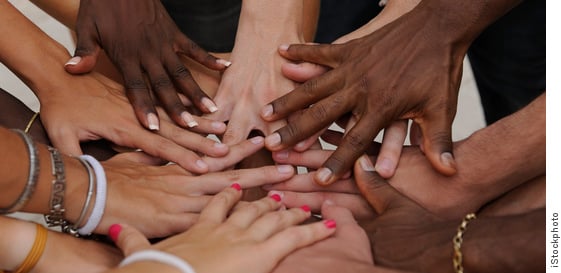
While everyone is variously upset angry, egocentric and alienated as a result
of their different encounters with humanity’s great, heroic battle against
ignorance, all humans are equally good, worthwhile and lovable.
And so, the simple and obvious fact is that some races are so relatively innocent and naive about life under the duress of the human condition that they lack the toughened self discipline and insecure egocentric drive to succeed of the more upset-adapted races and, as such, can’t legitimately compete with those people, so when they see an opportunity to obtain money and/or power and the material luxury both can bring they can’t resist taking it, whether it’s rightfully due or not. When Annie and I travelled through central Africa in 1992 everywhere we went, at every level of society, there was dysfunction, graft and corruption—even when we landed in Kenya we couldn’t leave Nairobi airport until we paid certain ‘fees’ to various airport officials. At the top of such societies you invariably find completely despotic regimes—for instance, we were told that the reason the roads beyond the centre of Nairobi weren’t sealed and were in a terrible state was because all the money for such infrastructure had been syphoned off by the country’s leaders to buy villas on the French Riviera and other luxuries. Indeed, an article titled ‘Corruption tearing at the heart of Kenya’ revealed that ‘only 1 per cent of government spending in Kenya can be properly accounted for, according to a report by the country’s Auditor-General’ (The Australian, 1 Aug. 2015).
And, again, the simple and obvious truth is that at the opposite end of the spectrum of alienation there are races where everyone is so upset-adapted, so soul-destroyed, so innocence-obliterated and manically egocentric and cynically selfish that graft and despotism is similarly endemic in their societies. Consider the events of early 2011, during the so-called Arab Spring, when the extreme despotism of almost every, if not every, Arab country right across North Africa and the Middle East provoked democracy-demanding uprisings throughout the region. During 2012 there were also reports in Australian newspapers every few days of the corruption that is endemic in China, where officials throughout the country are finding themselves unable to resist stealing whatever money they can lay their hands on. For example, under the heading ‘Top to bottom, a culture of payola in China with 29,000 corruption convictions in a year’, it was reported that ‘China’s corruption rate is astonishing even to its cynical citizens’ (The Australian, 13 Apr. 2012). The Chinese renowned love of gambling also indicates an extremely insecure need for a win, for material success, for self-worth reinforcement. And in India it was reported that ‘rampant corruption’ is so engrained there that the Indian government’s ‘Chief Minister’s spokesman Wahid Parra readily concedes that…it’s a virus in the society. It’s in our blood’ (ABC News, 11 Jan. 2016; see www.wtmsources.com/185).
It follows then that it is only at the middle of the spectrum of alienation, amongst 30-and-40-year-old, or thereabouts, equivalent races where there is enough upset-adapted self-discipline and toughness, but not so much that there is excessive soul-less cynicism and thus selfishness, that you get maximum functionality and operable behaviour in life under the duress of the human condition. The Anglo-Saxons are currently the stand-out example of such functionality, coming as they do from the more isolated and sheltered-from-upset north-western edge of Europe—they are actually more 30-year-old equivalents than 40-year-old equivalents. Although Anglo-Saxons come from a small, resource-deficient island, they have been so operable and thus successful and thus influential that they led the so-called ‘globalisation of the world’ to the point where ‘A quarter of the world’s population speak English…English is increasingly becoming entrenched as the language of choice for business, science and popular culture. Three-quarters of the world’s mail, for example, is currently written in English’ (TIME, 7 Jul. 1997). An article in the National Review titled ‘Empire of Freedom’ referred to the American internet entrepreneur James Bennett’s use of the term ‘Anglosphere’ to describe a coalition of English-speaking countries—the US, Great Britain, Australia, Canada, New Zealand and Ireland—that are ‘characterised by a high degree of individualism and dynamism, and by a talent for assimilation’. Bennett said it is ‘no accident that it was in the Anglosphere that the industrial revolution and parliamentary democracy first emerged…Nor is it an accident that when French intellectuals and Malaysian prime ministers wish to denounce free markets, the phrase they use is “Anglo-Saxon capitalism”’ (Ramesh Ponnuru, 24 Mar. 2003).
The Anglo-Saxons exhibit the same soulful enthusiasm, vitality and energy of the Vikings from Scandinavia who were referred to in paragraph 859 of FREEDOM. Indeed, like the Vikings, who sacked and settled in many parts of the British Isles, the Angles and Saxon tribes who colonised eastern England (and from whom the name Anglo-Saxon comes) were of southern Scandinavian stock. Also the Normans, who conquered England in 1066, were Scandinavians who had settled on the east coast of France—the name ‘Norman’ is actually derived from ‘northman’, meaning peoples from Northern Europe (Scandinavia). Of course, the basic Celtic stock of the British Isles are, like the Scandinavians, also an exceptionally isolated and thus relatively innocent ‘race’, especially coming, as a significant proportion of them did, from the early Celts of central Europe who were an extremely energetic, enthusiastic, relatively innocent/soulful 20-to-30-year-old equivalent adventurous ‘race’, but whose innocence had been lost elsewhere in the less isolated parts of Europe where they had spread. This description of these early Celts from Central Europe provides some indication of their 20-to-30-year-old equivalent personality: ‘The Celts were high-spirited warriors – head-hunters no less – who loved drinking and brawling [p.97 of 176] …The flamboyant Celts originated in central Europe…[having] moved into central Europe from somewhere east during the third millennium BC. They spoke a language that was probably the ancestral tongue of Indo-European…As the early Celts left no written words, it was the Roman and Greek observers who caught and preserved their fierce mien. [Recording that] “Nearly all the Gauls [Celts from France] are of a lofty structure…fair and ruddy complexion; terrible from the sternness of their eyes, very quarrelsome, and of great pride and insolence. A whole troop of foreigners would not be able to withstand a single Gaul if he called to his assistance his wife, who is usually very strong, and with blue eyes.”…“The whole race…is war mad and both high spirited and quick for battle, although otherwise simple and not uncouth” [p.110]’ (A Soaring Spirit: Time-Life History of the World 600–400 BC, 1988). Of course the Romans dismissed the northern and north-western Celts as barbaric savages while portraying themselves as superior, more advanced, civilised people, but again, as was explained in Video/F. Essay 14, that was all part of the reverse-of-the-truth lie that our ancestors weren’t cooperative and loving but instead were savage animals competitively and aggressively trying to reproduce their genes. The following series of images that was included in Video/F. Essay 14 make the point.
It is us humans now who are psychotic angry, egocentric and alienated, seemingly ‘evil’ monsters!
Detail from Jean-Michel Basquiat’s 1982 ‘Untitled’ painting which was sold in May 2017 for US$110.5 million, which, at the time was the sixth most expensive artwork ever sold at auction, no doubt because of its extraordinarily honest portrayal of the true nature of our present horrifically psychologically upset human condition—see Freedom Essay 30.
With regard to isolation preserving innocence, this quote from the 2008 RTÉ documentary The Origins of the Irish, which was narrated by Diarmuid Gavin, provides dramatic genetic evidence of the importance of isolation in preserving innocence, in this case in preserving Europe’s original variety of humans on the continent’s extreme outer western fringe in Ireland: ‘[Gavin:] People first came to Ireland about 10,000 years ago…As we’ll find out, many of us are directly descended from the first wave of settlers who made Ireland home… [Professor Daniel Bradley:] As to where we [the Irish] originally come from, there’s an idea and it’s a good idea, that during the last glacial period a group that survived in southern Europe in the west after the ice moved up, they would have moved up and peopled in a band the western part of Europe. [Gavin:] The stone age people carried a distinctive genetic marker which can still be detected in Europe today. But when the frequency of this marker is mapped, a striking pattern emerges. It’s found in just 2% of Turkish men, but moving west the marker increases in frequency, rising to 50% in central Europe and to even higher levels as you get closer to the Atlantic coast. And the highest occurrence anywhere is in Ireland. On average, almost 80% of our population have the marker and in Connacht [western province of Ireland] it’s found in a remarkable 98% of men.’
And these further DNA studies reported by Oliver Moody in The Times on 22 Feb. 2018 in an article titled ‘Ancient Britons overrun by folk from the Steppes’ evidence how these Ancient Britons were then ‘swamped’ by the ‘Indo-European’ speaking, ‘high-spirited’, ‘flamboyant’, 20–30-year-old equivalent ‘warrior’ ‘early Celts’ from ‘central Europe’ and, prior to that, from the Eurasian ‘steppes’: ‘Within a few hundred years of the last stone [of Stonehenge] being winched into place, the native Britons who built the monument had been almost entirely replaced by lighter-skinned, bluer-eyed migrants originating in the windswept steppes of Ukraine and Russia. The results of one of the largest ancient DNA studies yet conducted, published in the journal Nature [‘The Beaker phenomenon and the genomic transformation of northwest Europe, Nature, Vol. 555, 8 Mar. 2018] show that more than 90 per cent of the genetic make-up of the British Isles was “swamped” by the new arrivals from the Continent. Exactly how this happened remains a mystery. What is clear, though, is that the shift was permanent as it was abrupt, stretching from Dorset to Orkney. These invaders were our forebears. “Anyone who’s got British ancestry going back a couple of hundred years will have a predominance of steppe ancestry,” said Ian Armit, professor of archaeology at the University of Bradford. “Once it’s here, that’s essentially the ancestry of the historic British population.”’ (For the explanation of the ‘arms race’ that led to the emergence from the steppes of 20–30-year-old equivalent races such as the early Celts, see pars 902–917 and par. 1034 of FREEDOM.)
The comparative functionality of the 30–40-year-old equivalent races—which, again, the Anglo-Saxons are currently the stand-out example—and their resulting material success has, however, led to extreme envy and frustration by those not so functional and thus materially successful, which the immensely improved communication technology of recent years has greatly exacerbated. People in the materially impoverished parts of the world suddenly had access to programs like Baywatch (TV series 1989-2001), in which gorgeously groomed Californians in stunningly enticing swimsuits played in a fabulously ordered and materially wealthy world, and naturally they were overcome with distress about what they now knew they were missing out on. The psychiatrist Clancy McKenzie gave this stark description of, what might be termed, ‘the Baywatch effect’ or ‘materialism envy’ in action: ‘While visiting Machu Picchu in Peru in 1979 I noted very poor persons, living in the mountains, who had only the clothes they wore and perhaps a lama or two, but had beautiful, warm smiles and seemed content and happy. Days later I was in Bogota in Colombia. It was a very hot day and we asked the driver to stop at an outdoor tavern to buy cold beer. The people were very impoverished, but there was a TV playing and they were able to view the “outside world” where everyone seemed to have more, and luxury was abundant. I offered to go in with the driver and he urged me to wait in the car. I soon learned why. The absolute hatred was so intense that it was palpable. These people did not have less than those in Machu Picchu but they saw others who had more, and their needs were intensified’ (Letter to Prof. Harry Prosen, 27 Mar. 2006).
The result of this awareness of what materialism offers is that there is now rampant greed in all those populations who haven’t had the material luxury that is so prevalent in the more functional, mostly Western world. They see themselves as being on catch-up—they want the big house, a car, a fridge, a suit, a gown, a fancy watch, a beach holiday, Nikes, Coca-Cola and Big Macs, etc. The effect of this myopic drive for material wealth is that the natural inclination of our original instinctive self or soul to be selfless and loving has been thrown by the wayside with cynicism now reigning across the less functional and materially fortunate countries. The following is another description of the consequences of ‘materialism envy’ in Kenya, but it very much applies to what is happening throughout Africa, South America, China, India, south-east Asia and in parts of the Middle East. In her 2000 book, African Visions, the Kenyan photographer Mirella Ricciardi wrote of her country’s ‘chaos and confusion, the crime and lawlessness, the greed, the bribery and corruption at all levels, the senseless wildlife killings, the environmental destruction, the mindless power games, the hopeless destitution and hunger, the lack of concern and forward thinking…The outrageous greed and disregard for anything and anyone other than themselves and their immediate families in the top ranks of governments, have created a financial drain on the country that filters down and affects whole populations in varying degrees, threatening the fragile infrastructure of the land. All those, without exception, who have somehow attained a position of command and authority, however humble, have but one idea in mind, to emulate the example set by the head of state – to milk their positions for all they are worth, for as long as it lasts. Because finances are siphoned off to Swiss bank accounts, salaries are so low they need topping up by whatever means. As a consequence bribery and corruption at every level is the only option. The police force and judiciary, the ministers, the administrators, the teachers, the doctors and the heads of government divisions, extract whatever they can, by fair means or foul, under the guise of their uniforms and titles, while the country collapses and the masses starve’ (pp.260-261 of 287).
As McKenzie’s example of the ‘Baywatch effect’ shows, the material inequality in the world that sophisticated communication technology has made visible to everyone has made those who are missing out not only extremely envious, but resentful and thus angry, to the point of feeling ‘absolute hatred’ towards the more materially successful. Their self-esteem has suffered so much that angry retaliations, like the flying of those planes into The Pentagon and the World Trade Center on September 11, 2001, have occurred; Osama bin Laden actually said the 9/11 attacks ‘were revenge for Western humiliation of Muslims’ (TIME, 7 May 2012). When the Muslim sympathiser Tessa Kum wrote, ‘I am coming to hate you, white person. You have all the control, all the power, all the privilege’ (Sydney’s Daily Telegraph, 18 Dec. 2014), she was expressing what psychiatrist Tanveer Ahmed was referring to when he wrote about ‘aspects of Islamism, which is…resentful [of] humiliation, unable to accept the reality of the weak place of Islamic civilisation and determined to act destructively’ (ibid).
Yes, as a result of the emergence of overwhelming levels of upset in the last 200 years humanity has endured two massive world wars and countless other insurgencies, as well as the inglorious honour of inventing weapons of such ferocity that they could wipe out entire cities—and these weapons are now in the hands of extremely psychologically distressed rogue countries like North Korea, whose attitude towards the rest of the world is one of ‘We don’t care any longer, we just want relief for our egos’; ‘It’s either death or glory and if it’s going to be death for us then it’s going to be death for everyone because we’re not going to back down and give up on our need for glory, which is, in effect, what you’re asking us to do.’
North Korean leader Kim Jong-un
So, the real debate about the horrific material inequality and the terrorism and frightening instability in the world requires analysis of the differences in upset-adaption between races, but until the upset state of the human condition was compassionately understood, as it now is, that debate could not take place. The problem of selfishness in the world was not being addressed honestly and thus properly anywhere.
It should also be pointed out that what people are really doing when they try to or actually remove tyrants/despots like Robert Mugabe, Saddam Hussein, Muammar Gaddafi, Hosni Mubarak, etc, etc, from power in the hope that those countries will become functional democracies is trying to make 20-year-old equivalents and 50-year-old equivalents behave like 30-and-40-year-old equivalents. But, as was explained, societies of 20-year-old equivalents and 50-year-old equivalents are going to revert to selfishness, at which point a selfish power struggle will occur where, in the end, the most ruthless will take over once again, a struggle we are currently witnessing in Syria. Having solved nothing at a fundamental level, those societies will invariably remain dysfunctional, resulting in further floods of refugees from those countries to others populated by more functional 30-and-40-year-old equivalent races. Efforts to avoid this cycle, or at least contain it somewhat, in countries where there is too much cynical selfishness only led to the creation of authoritarian, dictatorial, freedom-and-democracy-denying, free-thinking-restricted, human-mind-oppressive regimes—which were therefore still fundamentally tyrannical and despotic—like those that have been established in China, and (to a degree) by Lee Kuan Yew in Singapore. The other form of tyranny that developed to contain excessive cynical selfishness was strict obedience to fundamentalist interpretations of religious teachings—as has occurred in many parts of the Arab world.
The fact is, a society that did not contain a significant proportion of functional 30-and-40-year-old equivalents was not going to be a functional one. Historically, ‘the chief charge [against Jews] has been that Jews are somehow uniquely engaged—at other people’s expense—in money making’ (Ideas that shaped our World, ed. Robert Stewart, 1997, p.55 of 223), and with compassionate understanding of the human condition we can understand that there was some truth in this view. The cynical 50-year-old equivalent Jews have managed to remain operational and, as a result, extremely materially successful by living amongst relatively selfless, functional 30-and-40-year-old equivalent races—which is the real reason they have been persecuted in the predominately 30-and-40-year-old equivalent countries in which they settled. (The dishonest reason for their persecution being that they were the murderers of Christ.) In this light it can be seen why the Pygmies and the Bushmen have resented the Bantu for being more operational and materially successful than they are, while the Bantu in turn have resented not only the Tutsi (which accounts for their attempted ‘ethnic cleansing’ of the Tutsi), but even more, the European Caucasians for being more operational and materially successful than they are—with the Caucasians in turn resenting and thus persecuting the Jews for being more operational and materially successful than they are. Everywhere the inevitable differences in upset between individuals, races, genders, ages, generations, countries, civilisations and cultures have caused immense problems, so the greater truth is that it is a very great tribute to the character and courage of the human race as a whole that it has managed to maintain some semblance of functionality and cooperation under that almost impossible situation.
I might add here a balancing comment about the Jewish race having benefited from living amongst more innocent, soulful, selfless 30-and-40-year-old equivalent races. In paragraphs 842–843 of FREEDOM I explain that the reason brain volume, and with it, in the case of humans, mental cleverness, plateaued towards the end of the last 2 million years of its growth is because a balance was struck between the need for cleverness and the need for soundness—between knowledge-finding yet corrupting mental cleverness and conscience-obedient yet non-knowledge-finding lack of mental cleverness, with the average IQ today representing that relatively safe conscience-subordinate compromise. It is true that the ability to find answers didn’t necessarily accompany increased intelligence because, as just described, increased intelligence tended to lead to an increase in upset and thus alienation, and alienation from our Integrative-Meaning-orientated, instinctive self or soul made thinking truthfully and thus effectively very difficult; however, a high degree of intelligence was still required to find knowledge, most especially in complex subject areas like higher mathematics and physics. Thus, if the human race couldn’t develop exceptionally high levels of intelligence then many crucial understandings about the nature and workings of our world would not have been able to be found. The Jews are renowned for being exceptionally intelligent, which is consistent with them being an exceptionally upset race, and it is from within their ranks that some of the greatest minds and insights have emerged: Albert Einstein, with his breakthrough insights into the physical nature of our universe, is the most obvious example. It is true that Einstein must have had an exceptional degree of soulful soundness to have been as an effective thinker as he was, but he also must have been exceptionally intelligent to so successfully grapple with the extremely complex subjects he was dealing with. I haven’t ever tried to collate all the intellectual contributions to the human journey that the Jews have made, but it would be very significant, as evidenced by this extraordinary statistic: ‘just 0.2 per cent of the world population, Jews accounted for 29 per cent of Nobel Prizes in the late 20th century, and 32 per cent so far in 21st century’ (The Spectator, 6 May 2014). By, in effect, allowing exceptional cleverness/intelligence to develop by countering its corrupting effects with the presence of people who were not so intellectually clever and thus not so upset and thus not so upset-adapted was, in the bigger picture, a fortuitous outcome for the human race. But again, talking about races having different levels of intelligence was very dangerous while we couldn’t explain the human condition, explain that all humans are equally good—which is why James Watson, one of the Nobel Prize-winning co-discovers of the DNA double helix, was condemned and ostracised for ‘daring to suggest that race and intelligence are linked’ (The Independent, 2 Jan. 2015; see www.wtmsources.com/149).
On the whole we can see that with understanding of the human condition it at last becomes possible to explain in psychological terms what was actually happening when history books spoke of civilisations having ‘peaked’ and become ‘decadent’. As with each individual during his or her life, under the duress of the human condition all races eventually became overly corrupted, corruption of our original instinctive self or soul being the price of humanity’s heroic search for knowledge. In this journey from innocence to exhaustion of soul the most creative period was the toughened and disciplined, but not yet overly corrupted, 30-year-old equivalent stage. As each race and its associated civilisation passed through this stage it made its particularly creative contribution to the human journey. This was when civilisations were at their ‘peak’; inevitably, however, they entered a more corrupted ‘decadent’ stage. To look at just the Mediterranean, Middle East, Indian and Eastern civilisations, they all made extensive contributions to the human journey during their energetic and creative 30-year-old equivalent stage. The Egyptians and peoples from the fertile crescent of the Tigris and Euphrates delta in the Middle East instigated the civilisation of the ‘known world’; for example, they invented the wheel, mathematics and writing, and divided time into minutes and seconds. In the case of the Greeks and Romans, they laid the foundations for ‘Western civilisation’ during this most creative stage of their journey through ever-increasing levels of upset. The great religions of the world, Hinduism, Buddhism, Judaism, Christianity and Islam, were developed in India and the Middle East when there was still enough alienation-free, soulful soundness left in their populations to produce some exceptionally sound, truthful, unresigned, denial-free thinkers or prophets. (The life of the prophet Christ is explained in F. Essay 39.) And during their most creative stage, the Chinese contributed to the human journey such influential inventions as paper, moveable type, the compass and gunpowder. The truth is ALL civilisations right back through history made important contributions to the advancement of knowledge—but just where the leading edge in the advancement of knowledge was occurring at any one time depended on what stage in the human journey from innocence to exhaustion and decadence those various civilisations were at.
With regard to presenting a perfectly balanced account of all the different states of upset and their interactions and effects, such as that of the story of the Jewish race, it has to be recognised that the human journey has been such a complex story that a perfectly balanced view is beyond the powers of effective interpretation in this very early stage of viewing the history of the human race in a denial-free way. And such a detailed interpretation can actually wait because what is so important now—and this is all explained on the Transformation page on the WTM website, and in the final chapter (9) of FREEDOM—is that the human race can leave behind its whole upset history as compassionately dealt with—our history is finally, as the saying goes, just that—it’s ‘all just history’ now. As is explained, what brings all the horror of life under the duress of the human condition to an end is the Transformed Way of Living. (With regard to whether some people and some races will find it easier than others to adopt the Transformed Way of Living, FAQ 4.5 describes why the more innocent and the more upset will struggle the most.)
My job, as the synthesiser of understanding of the human condition, is to get at least the main descriptions of all the hard truths up and dealt with so that humanity can move well out into the clear, free of the past. Yes, as is emphasised in F. Essay 15 and chapter 9 of FREEDOM, we get the truth up and then we move on to a wonderful new world free of the agony of the human condition. We leave the old effectively dead, dishonest world behind and enter an indescribably happy and free Transformed Lifeforce State, which the songwriter and singer Bono (of the band U2) sang about: ‘I’ve conquered my past [found the dignifying, human race liberating understanding of the human condition] / The future is here at last / I stand at the entrance to a new world I can see / The ruins to the right of me / Will soon have lost sight of me’; and similarly, as Beethoven’s famous Ninth Symphony anticipated, ‘Joy!’, ‘Joyful, as a hero to victory!’, ‘Join in our jubilation!’, ‘We enter, drunk with fire, into your [human-condition-understood] sanctuary…Your magic reunites…All men become brothers…All good, all bad…Be embraced, millions! This kiss [of understanding] for the whole world!’ (1824). (More prophetic songs about the arrival of understanding of the human condition are included in F. Essay 45.)
It no longer matters who is more cynical, more human-condition-adapted, because the Transformed State leaves all that behind. The greater truth is we humans have all become well and truly corrupted/upset/messed-up/damaged/soul-devastated anyway, but none of that matters now because we are leaving that upset world, we are out of there; we have won the match and we can now all head for the showers and get ready for humanity’s great victory party—and soon even the different scars we all carry from the match will be healed and gone, soon the human race will be rehabilitated. Even the upset that is now instinctive, in our genes, will not be an issue because when our capacity to love is finally liberated, as it can now be, it will effectively make all our upset—both psychological and instinctive—disappear without a trace. It is all history now; ‘the ruins to the right of [us], will soon have lost sight of [us]’; ‘all good, all bad’, ‘this kiss [of understanding is] for the whole world!’
Yes, in Martin Luther King Jr’s words, ‘allow freedom to ring…from every village and every hamlet, from every state and every city’ because ‘all of God’s children, black men and white men, Jews and Gentiles, Protestants and Catholics’, the more innocent and the more upset, the short and the tall, the big and the small, those who are left-handed and those who are right-handed, the butcher, the baker and the candlestick-maker, EVERYONE, can ‘join hands and sing’, ‘Free at last! Free at last! Thank God Almighty, we are free at last [from unjust condemnation]!’ (‘I Have A Dream’ speech, 28 Aug. 1963). (see par. 1279 of FREEDOM)
With regard to my job as someone who is able to confront the human condition of having to get all the main truths up, there is another issue relating to differences in alienation between races that I should explain, and that is I need to explain why the Judeo-Christian Western culture, like the right-wing in politics, has been one of the main targets for rejection by the ‘woke’, identity politics, cancel culture movement.
The British author and political commentator Douglas Murray gave a good description of this rejection of the Western tradition in a summary he wrote of his 2022 book The War on the West: ‘In a few short decades, the Western tradition has moved from being celebrated…to being something shameful…while the West is assaulted for everything it has done wrong, it now gets no credit for having got anything right. In fact, these things – including the development of individual rights, religious liberty, and pluralism – are held against it…The culture that gave the world lifesaving advances in science, medicine and a free market that has raised billions of people around the world out of poverty and offered the greatest flowering of thought anywhere in the world is interrogated through a lens of the deepest hostility…All aspects of the Western tradition now suffer the same attack. The Judeo-Christian tradition that formed a cornerstone of the Western tradition finds itself under particular assault and denigration. But so does the tradition of secularism and the Enlightenment, which produced a flourishing in politics, sciences and the arts…these inheritances are criticised as examples of Western arrogance, elitism, and undeserved superiority. As a result, everything connected with the Western tradition is being jettisoned. At education colleges in America, aspiring teachers have been given training seminars where they are taught that even the term “diversity of opinion” is “white supremacist bullshit”…this war on the West…now exists at the very top of the American government, where one of the first acts of the new administration was to issue an executive order calling for “equity” and the dismantling of what it called “systemic racism”. We appear to be in the process of killing the goose that has laid some very golden eggs’ (The Australian, 30 May 2022).
I provide a full description of why this rejection of the Judeo-Christian Western tradition, this assault on the West, has occurred in Addendum 2 of my booklet Death by Dogma, so I strongly recommend reading that, but the following is a very brief summary of that explanation.
In that Addendum 2 of Death by Dogma I explain that everyone has intuitively been aware that, being the most operational under the duress of the human condition, the 30-to-40-year-old-equivalent white male developers of the Judeo-Christian Western tradition are currently at the leading edge of the search for knowledge, and thus best placed to solve the human condition. And since everyone has been intuitively aware of this critically important task of solving the human condition that this group has, everyone has been prepared to tolerate a degree of extra material good fortune and colonising power that the exceptional functionality of this group afforded it. But this tolerance has its limit: if this group is seen to be failing to deliver the answers that it was especially tasked with finding, then disenchantment with it, and resentment of its good fortune, would occur. And this is exactly what has occurred. Although understanding of the human condition has actually been found and is presented in my book FREEDOM, that breakthrough is yet to be widely known, and so, as Murray wrote, the ‘deepest hostility’ and ‘denigration’ ‘of the Western tradition’ has emerged amongst less functional groups.
– – – – – – – – – – – – – – – – – –
Please note that F. Essay 40 talks about the ‘Judgment Day’ shock of exposure of all the truths the human race has been living in denial of while the human condition wasn’t able to be explained—one of the main shocks being acknowledgement of the difference in alienation between races.
More can be read about the differences between races in chapters 8:16E-F of FREEDOM. And for testimonials on the power of this information to end racism, we recommend watching/reading the presentations in Video/Freedom Essay 8 from Franklin Mukakanga of Zambia, and Refentse Molosiwa of South Africa.
As mentioned, you can watch Jeremy Griffith present the breakthrough reconciling understanding of the human condition in THE Interview; for a fuller explanation read chapter 3 of FREEDOM; and for a summary presentation of the key ‘instinct vs intellect’ explanation watch Video/F. Essay 3.
Discussion or comment on this essay is welcomed—see below.
Please Note, if you are online you can read, print, download or listen to (as a podcast) THE Interview, The Great Guilt, The Great Transformation, Sermon On The Beach or any of the following Freedom Essays by clicking on them, or you can find them all at www.humancondition.com.
INTRODUCTION TO THE EXPLANATION & RESOLUTION OF THE HUMAN CONDITION: THE Interview That Solves The Human Condition And Saves The World! | The Great Guilt that causes the Deaf Effect | The Great Transformation: How understanding the human condition actually transforms the human race | Sermon On The Beach | Freedom Essay 1 Your block to the most wonderful of all gifts | 2 The false ‘savage instincts’ excuse | 3 THE EXPLANATION of the human condition | 4 The ‘instinct vs intellect’ explanation is obvious – short | 5 The transformation of the human race | 6 Wonderfully illuminating interview | 7 Praise from Prof. Prosen | 8 “How this ends racism forever” | 9 “This is the real liberation of women” | 10 What exactly is the human condition? | 11 The difficulty of reading FREEDOM and the solution | 12 One hour summarising talk | 13 The WTM Deaf Effect Course | 14 Dishonest biology leads to human extinction | 15 How your life can immediately be transformed | 16 The Shock Of Change | THE BOOKS: 17 Commendations & WTM Centres | 18 FREEDOM chapter synopses | 19 FREEDOM’s significance by Prof. Prosen | 20 The genius of Transform Your Life | THE OTHER KEY BIOLOGICAL EXPLANATIONS: 21 How did we humans acquire our altruistic moral conscience? | 22 Fossil discoveries evidence our nurtured origins | 23 Integrative Meaning or ‘God’ | 24 How did consciousness emerge in humans? | 25 The truthful biology of life | • Survey seeking feedback | MEN & WOMEN RECONCILED: 26 Men and women reconciled | 27 Human sex and relationships explained | THE END OF RACISM: 28 The end of racism | 29 Can conflict ever end? | RESIGNATION: 30 Resignation | 31 Wordsworth’s all-revealing great poem | MORE ON THE TRANSFORMATION: 32 More on the Transformation | 33 Jeremy on how to become transformed | THE END OF POLITICS: 34 This understanding ends the polarised world of politics | 35 Death by Dogma left-wing threat | 36 Saving Western civilisation from left-wing dogma | 37 The meaning of superhero and disaster films | RELIGION DECIPHERED: 38 Noah’s Ark explained | 39 Christ explained | 40 Judgment Day finally explained | 41 Science’s scorn of religion | MEANING OF ART & CULTURE: 42 Cave paintings | 43 Ceremonial masks explained | 44 Art makes the invisible visible | • Second survey seeking feedback | 45 Prophetic songs | 46 Anne Frank’s faith in human goodness fulfilled | 47 Humour and swearing explained | 48 R.D. Laing’s fearless honesty | ABOUT BIOLOGIST JEREMY GRIFFITH: 49 Jeremy’s biography | 50 Australia’s role | 51 Sir Laurens van der Post’s fabulous vision | 52 Jeremy’s children’s book A Perfect Life | 53 The ‘instinct vs intellect’ explanation is obvious – long | 54 The accusation of hubris | DO WE FAIL OR DO WE MAKE IT? 55 Endgame for the human race | 56 Why there have been ferocious attacks on the WTM | 57 Magnificence of the Transformed State – video 1 | 58 Magnificence of the Transformed State – video 2 | MARKETING: 59 Shouldn’t the WTM’s website be toned down? | 60 The crime of ‘ships at sea’ ‘pocketing the win’ | GENERAL DISCUSSIONS BY JEREMY: 61 General Discussion by Jeremy Aug. 2018 | 62 Jeremy’s Masterpiece Presentation Feb. 2019 | HEALTH & HEALING: 63 Pseudo therapy/healing | 64 Real therapy/healing | From here on are Transformation Affirmations and More Good Info Emails
These essays were created in 2017-2024 by Jeremy Griffith, Damon Isherwood, Fiona
Cullen-Ward, Brony FitzGerald & Lee Jones of the Sydney WTM Centre. All filming and
editing of the videos was carried out by Sydney WTM members James Press & Tess Watson
during 2017-2024. Other members of the Sydney WTM Centre are responsible for the
distribution and marketing of the videos/essays, and for providing subscriber support.

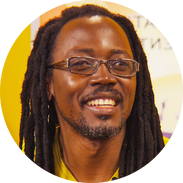
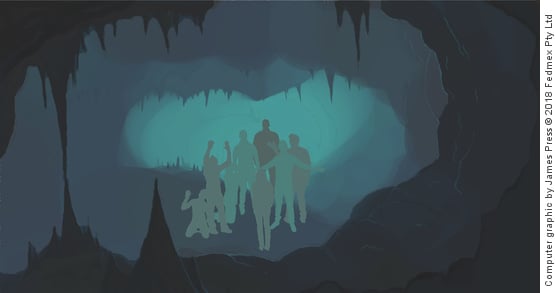
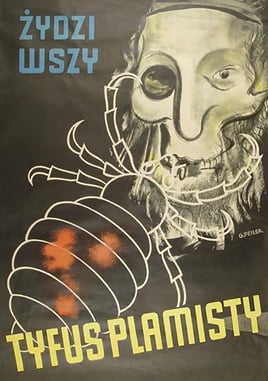

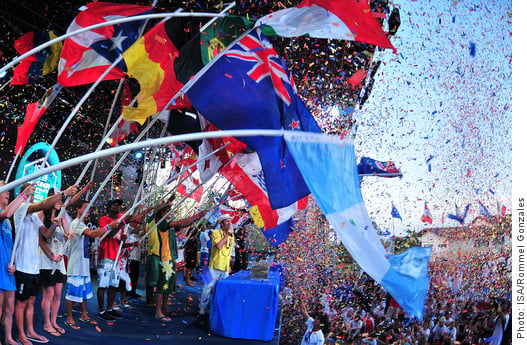


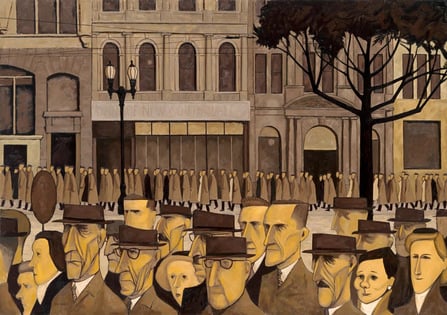



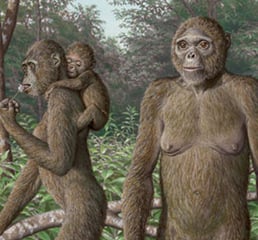
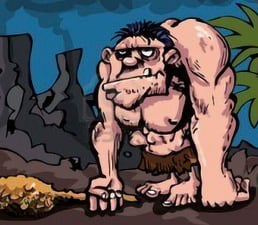
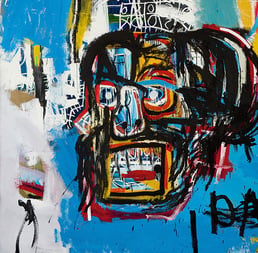
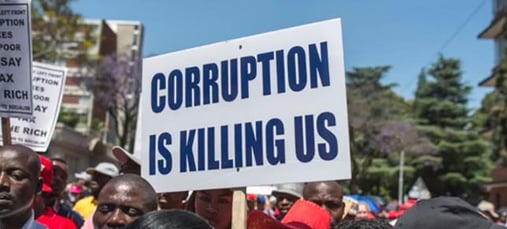



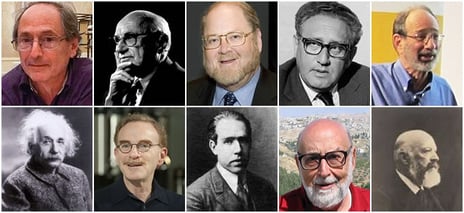

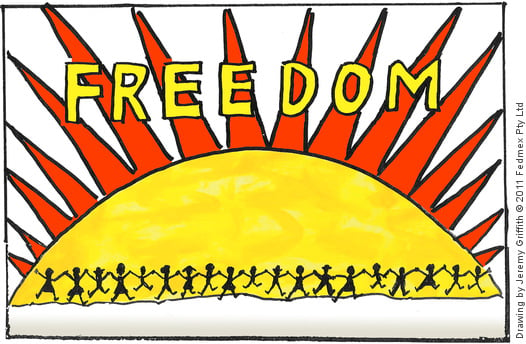
Please wait while the comments load...
Comments